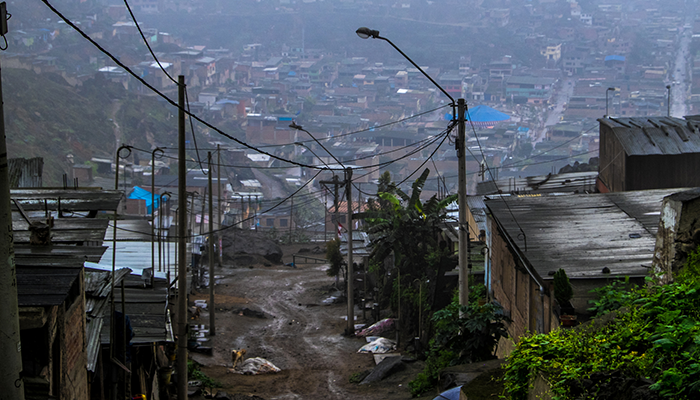“For the thieving nobleman, privilege – for the man who steals bread, jail,” wrote Pablo Neruda.
The observation of Latin America’s greatest poet captured the essence of inequality, which has been the single most important issue shaping society and politics in this region since the resentful locals booted out their Spanish overlords 200 years ago.
The struggle against inequality in all its forms – class, race, colonial – has, literally, been the heart pumping the political blood of Latin America since Independence which, at times, has haemorrhaged out through revolutionary wounds that have left deep scars.
As a result, no single theme has been as ideologically loaded, shaping every conceivable position on the spectrum of ideas past and present and explaining the rise and fall of both dictatorships and democracies.
Inequality remains a notable feature of Latin American societies today, and it is not hard to see why it has long fired political movements with moral outrage – in 2016, the wealthiest quintile enjoyed 45% of total household income, while the poorest scraped by on just 6%.
However, while that moral outrage has fuelled ideological imperatives to tackle inequality, other, more pragmatic arguments exist in support of doing so – and these have found an increasingly stronger voice since 2008.
In 1965, writing about revolutionary France, the historian Alfred Cobban captured this alternative perspective memorably when he stated: “Poverty is inefficient”.
While Cobban was a revisionist, across the Atlantic in Cuba bearded revolutionaries dipping into Das Kapital were coming to a remarkably similar conclusion.
An anecdote from the period sums up the distinction, implied by Cobban’s comment, between the ideological and the pragmatic.
 The story has it that Ernesto ‘Che’ Guevara – who gained absolute control over Cuban production as finance minister and minister of industries – added to his burgeoning portfolio the role of president of the National Bank when, during a late night meeting in 1959, Fidel Castro [pictured right] asked if anyone in the room was a good “economista” (economist).
The story has it that Ernesto ‘Che’ Guevara – who gained absolute control over Cuban production as finance minister and minister of industries – added to his burgeoning portfolio the role of president of the National Bank when, during a late night meeting in 1959, Fidel Castro [pictured right] asked if anyone in the room was a good “economista” (economist).
Half-asleep, Che raised his hand, to which Castro replied with surprise: “Che, I didn’t know you were a good economist.”
“Oh, I thought you said ‘good communist’,” Guevara replied. And the rest is history.
Che’s entire subsequent strategy was premised on the eradication of inequality not just as a moral mission – but as a means of raising stagnant sugar production so that the nascent revolution could survive. To Che, inequality was inefficient.
So it is appropriate that it was in Cuba earlier this year that the Economic Commission for Latin America and the Caribbean (ECLAC) launched its most radical statement on equality yet that gives it a position of leadership on this issue.
‘The struggle against inequality in all its forms – class, race, colonial – has, literally, been the heart pumping the political blood of Latin America since Independence’
The Inefficiency of Inequality represents a remarkable challenge to the insistence of classical economic thought that efficiency and equality are at odds.
Staunch advocates of free market competition argue that there is a “trade off” between economic efficiency and fairness – because acting to reduce inequality incurs an unacceptable cost to growth. Concentrating capital in the hands of a few maximises their capacity to invest, while correcting inequality reduces the incentive for individual effort.
ECLAC is having none of this, and points to an emerging consensus around a new “economics of equality” which states that inequality is, in fact, profoundly inefficient and hence a major barrier to development.
The commission argues that inequality corrodes productivity in a host of ways – from the damage it causes to education levels or workers’ health, to its impact on the labour market.
Its economists demonstrate that between 1980 and 2014 inequality had an adverse effect on productivity growth across Latin America and the Caribbean.
For example, they simulate a situation in which all working people aged between 25 and 55 have completed the first stage of secondary education (first to third year) – in some places, just 51% of citizens manage to do so – and find that household income rises by up to 25% in countries like Guatemala and Honduras.
Similarly, the ECLAC economists point to the damage to productivity caused by inequality in healthcare: poor nutrition stunts productivity because well-nourished, healthy people have greater physical and mental capacity for work and lower rates of absenteeism.
In Latin America, it has been estimated that between 1990 and 2000 annual changes in life expectancy contributed 1.5% a year to overall income growth, and 1.1% a year between 2000 and 2011.
Income inequality is closely associated with informality in the labour market – a problem that plagues Latin America, where 130 million informal workers eke out a living.
This informality is a fiscal headache, reducing tax takes and generating huge costs to treasuries to support people lacking access to contributory pensions. In Latin America, about 83% of informal workers do not pay into social security systems.
Gender inequality also stunts growth. One ECLAC exercise, for example, estimated what could be gained by giving women an equal stake in the labour market – and showed that household incomes would rise by up to 30% in some countries.
Moreover, inequality both damages the environment – making it much harder to develop efficient, sustainable production – while severely limiting the productivity of those most affected by that damage: the poor.
Latin America has been at the forefront of debates about inequality since 2000, when a wave of progressive governments came to power and engineered impressive gains in income distribution.
While since 2012 these gains have slowed – or even reversed – this has not distracted ECLAC from its crusade to change how we think.
Its assertion that inequality is an unacceptable drag on productivity might be considered a bold effort to convert religious marketeers, who persist in the belief that inequality is a necessary evil.
But in the final analysis, it merely revisits classical ideas that they may have lost sight of.
Adam Smith’s vision, for example, precluded endemic inequalities not out of moral concern – but because he believed doing so was simply the best way to maximise the wealth of nations.















